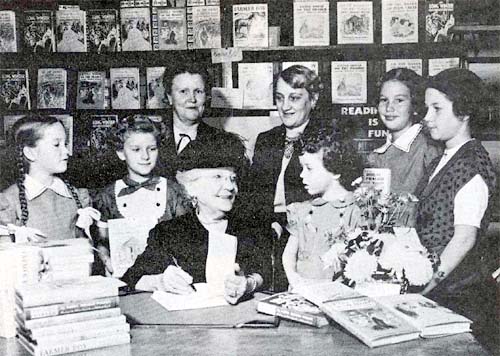Laura signs copies of her books at Brown’s Bookstore in Springfield, Missouri, October 1952. As far as I know, this photo is not copyrighted but was a publicity shot for a newspaper.

A few days ago, on February 7, the world—that is, Google, and Laura Ingalls Wilder fans—noted the 148th birthday of Laura Ingalls Wilder. Today is perhaps a more significant anniversary: the 58th anniversary of her death.
Laura was the author of the famous “Little House” books, beloved by millions of children and adults, responsible for a new view of the American frontier and the people who settled it. Between 1930 and 1943, she had drafted nine books—eight of which were published in her lifetime—in Mansfield, Missouri, on Rocky Ridge Farm, where she also died, on February 10, 1957. The books celebated the independent spirit, optimism in the face of danger and penury, and love of wild places.
Laura’s death, and what was going on at the time, reveal much about her place in literary history. In her old age, a gulf separated Laura and her daughter/collaborator, Rose Wilder Lane. Rose was a novelist and journalist who secretly wrote the Little House books with her mother. Their secrecy about Rose’s part still colors fans’ understanding of their pioneer stories.
By 1957, when Laura died, Rose had faded from public note except for her growing collection of essays about the power of limited government. As I will tell in the book I am writing, Libertarians on the Prairie, Rose and Laura had a falling out halfway through their collaboration, in 1935. By Laura’s death, it was Laura and not Rose who had become the famous writer.
Laura’s landscapes drove deep into Americans’ imagination, and her fierce attachment to Rocky Ridge Farm in Missouri added to her authenticity. Rose, who’d made a career out of Missouri stories, had left Missouri two decades before and settled in Danbury, Connecticut. Rose had continued revising the Little House manuscripts her mother sent her in the mail. Rose had not visited Missouri at all between 1935 and 1949, when Almanzo Wilder, Laura’s husband and Rose’s father, died.
Laura left everything to Rose; Rose willed nothing to Laura
By Thanksgiving 1956, Laura’s last illness beckoned Rose to Mansfield, where she remained for about three months. Rose arrived in Mansfield finding Laura delirious. Laura was 89 and suffered from heart disease and diabetes. Rose, who would turn 70 that December, cooked and cared for Laura in the farmhouse where both of them had entertained writer friends a quarter-century earlier. Rose kept up her correspondence with friends, weirdly making no mention of Laura. She only noted, without elaboration, that she felt exhausted and under strain during the time we know she was in Mansfield.
Laura had already made a will leaving everything to Rose. Rose made her own will during that last visit to Mansfield, leaving nothing to Laura. “I intentionally make no provision in this Will for my mother… as I know that she has means ample for her support and welfare.” Sometime around late January, 1957, Laura was hospitalized in Springfield, 60 miles away, then Rose took her home. Laura died February 10, three days after her 90th birthday. She was buried in Mansfield next to Almanzo, and Rose returned to Connecticut, leaving much of the organization of belongings to Irene and Lewis Lichty, who had befriended Laura. The Lichtys led the movement to buy back the Rocky Ridge farmhouse from a family to whom Laura had sold it for a small sum (retaining a life lease). Rose agreed reluctantly to buy back the farm, and then she agreed to put several thousand dollars toward a museum and curators’ house next door where the Lichtys would live rent-free.
